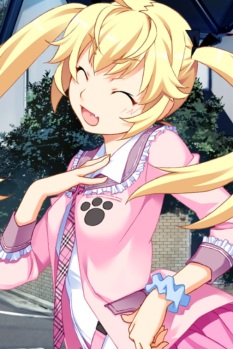 You may have heard of, or even played, Le Fruit de la Grisaia, the first game of a trilogy of visual novels recently kickstarted by Sekai Project for a release in English. While we are still waiting for the release of the next two games, there’s actually another game to check out right now, as the first stretch goal of the Kickstarter also allowed for the localization of the series’ comedic spin-off game, Idol Magical Girl Chiru Chiru Michiru. Where the main games are run-of-the-mill “dating sims” where a male protagonist get to meet a number of extra-ordinary girls and pursue their individual story and romance one by one, this spin-off takes one of these heroines, Michiru, and makes her the protagonist of a linear, comedic story taking place in a alternate universe where she sings as an idol and fights evil as a magical girl.
You may have heard of, or even played, Le Fruit de la Grisaia, the first game of a trilogy of visual novels recently kickstarted by Sekai Project for a release in English. While we are still waiting for the release of the next two games, there’s actually another game to check out right now, as the first stretch goal of the Kickstarter also allowed for the localization of the series’ comedic spin-off game, Idol Magical Girl Chiru Chiru Michiru. Where the main games are run-of-the-mill “dating sims” where a male protagonist get to meet a number of extra-ordinary girls and pursue their individual story and romance one by one, this spin-off takes one of these heroines, Michiru, and makes her the protagonist of a linear, comedic story taking place in a alternate universe where she sings as an idol and fights evil as a magical girl.
I’m pretty sure this game was originally announced in Japan as an April’s Fool… or maybe presenting it as an April’s Fool was the April’s Fool? In any case, the game was actually developed and released in two parts, but considering its origin and its ridiculous premise, it would be easy to take this game as a joke itself. I hesitated buying it myself, even though I’m a Michiru fan, and even when it was at half the price on Steam. Little did I know that it would become one of my favorite visual novel ever! Idol Magical Girl Chiru Chiru Michiru is surprisingly one of the most solid Japanese visual novel I’ve played, mostly because it possess qualities I’ve stopped expecting from games of this scene: a great accessibility, along with a unified story direction and a sincere love for its main characters.
Continue reading Idol Magical Girl Chiru Chiru Michiru – Best girl gets the best game



